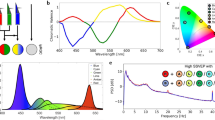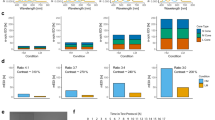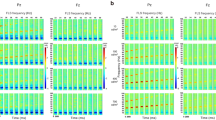Abstract
ALLESSANDRO VOLTA'S famous experiment in 1800 when he stimulated the nerve of the leg of a frog by a battery of a few volts is well known. In his collected works1, however, much more attention is given to another experiment, when he applied two electrodes to different parts of his face and experienced, with eyes closed, a brilliant light and sometimes a bright circle while closing or opening the circuit including his little battery.
This is a preview of subscription content, access via your institution
Access options
Subscribe to this journal
Receive 51 print issues and online access
$199.00 per year
only $3.90 per issue
Buy this article
- Purchase on Springer Link
- Instant access to full article PDF
Prices may be subject to local taxes which are calculated during checkout
Similar content being viewed by others
References
Volta, ‘Colezione del'opere’, Tome 2, Vol. 2, p. 124.
Purkinje, J., ‘Beiträge zur Kenntnis des Sehens in subjektiver Hinsicht’, 50 (Prague, 1819). Purkinje excited ‘Galvanic light patterns’ (stripes and arches) with a voltaic cell of 20 V.
Penfield, W., and Rasmussen, T., ‘The Cerebral Cortex of Man’, 140 (New York, 1955).
Knoll, M., Psychol., 17, 110 (1958).
Author information
Authors and Affiliations
Rights and permissions
About this article
Cite this article
KNOLL, M., KUGLER, J. Subjective Light Pattern Spectroscopy in the Encephalographic Frequency Range. Nature 184, 1823–1824 (1959). https://doi.org/10.1038/1841823a0
Issue Date:
DOI: https://doi.org/10.1038/1841823a0
This article is cited by
-
�ber ein frequenzabh�ngiges Ellipsenph�nomen bei elektrischer Reizung des helladaptierten menschlichen Auges
Pfl�gers Archiv f�r die Gesamte Physiologie des Menschen und der Tiere (1968)
-
Anregung von subjektiven Lichterscheinungen (Phosphenen) beim Menschen durch magnetische Sinusfelder
Pfl�gers Archiv f�r die Gesamte Physiologie des Menschen und der Tiere (1968)
-
Form-similarity between Phosphenes of Adults and pre-School Children's Scribblings
Nature (1965)
Comments
By submitting a comment you agree to abide by our Terms and Community Guidelines. If you find something abusive or that does not comply with our terms or guidelines please flag it as inappropriate.



